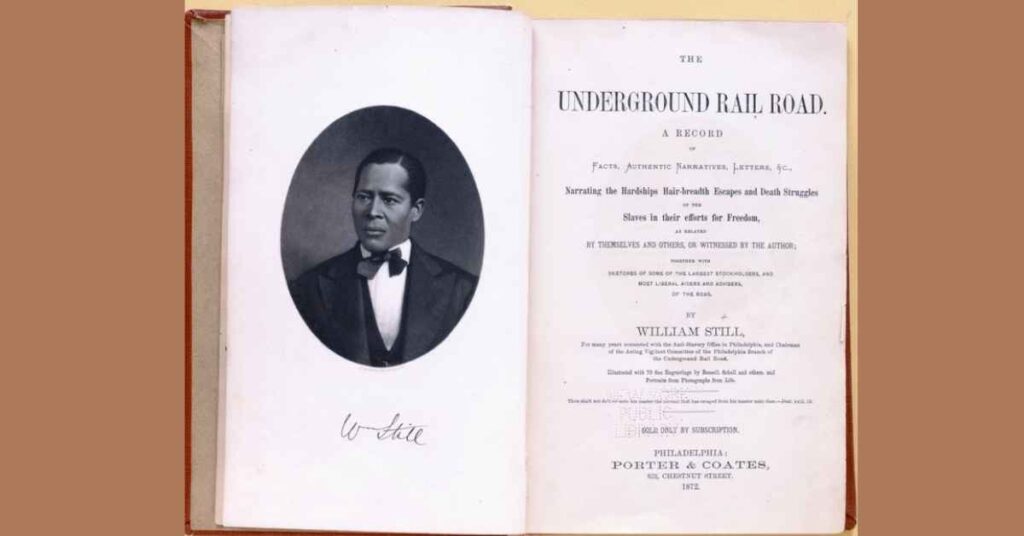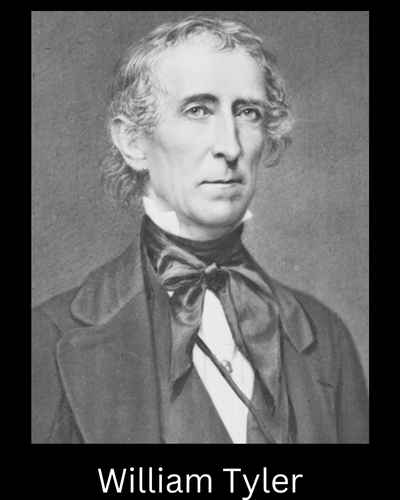This excerpt from “The Underground Railroad” by William Still documents the escape of James Christian from the household of former U.S. president John Tyler.
Tyler was the tenth American president. He wasn’t actually elected to the office. He had been vice president when President William Harrison died. Tyler served one term from 1842 to 1845.
He favored the rights of states to retain slavery. He would later side with the confederacy in the Civil War. Before that event, his household lost at least one slave who fled to freedom.
That fugitive was James Christian who had lived at the White House during Tyler’s presidency. We publish his account below.

Excerpt – Account Of James Christian
[The headings and text in italics were added by the website editor. The rest is verbatim from the book]
James Hambleton Christian is a remarkable specimen of the “well fed, &c.” In talking with him relative to his life as a slave, he said very promptly,
“I have always been treated well; if I only have half as good times in the North as I have had in the South, I shall be perfectly satisfied. Any time I desired spending money, five or ten dollars were no object.”
At times, James had borrowed of his master, one, two, and three hundred dollars, to loan out to some of his friends.
With regard to apparel and jewelry, he had worn the best, as an every-day adornment.
With regard to food also, he had fared as well as heart could wish, with abundance of leisure time at his command.
His deportment was certainly very refined and gentlemanly. About fifty per cent. of Anglo-Saxon blood was visible in his features and his hair, which gave him no inconsiderable claim to sympathy and care.
Excerpt – First Owners
He had been to William and Mary’s College in his younger days, to wait on young master James B.C., where, through the kindness of some of the students he had picked up a trifling amount of book learning.
To be brief, this man was born the slave of old Major Christian, on the Glen Plantation, Charles City county, Virginia.
The Christians were wealthy and owned many slaves, and belonged in reality to the F.F.V’s.
On the death of the old Major, James fell into the hands of his son, Judge Christian, who was executor to his father’s estate.
Excerpt – How He Came To Be Owned By An Ex-President

Subsequently he fell into the hands of one of the Judge’s sisters, Mrs. John Tyler (wife of Ex-President Tyler), and then he became a member of the President’s domestic household, was at the White House, under the President, from 1841 to 1845.
Though but very young at that time, James was only fit for training in the arts, science, and mystery of waiting, in which profession, much pains were taken to qualify him completely for his calling.
After a lapse of time; his mistress died. According to her request, after this event, James and his old mother were handed over to her nephew, William H. Christian, Esq., a merchant of Richmond.
From this gentleman, James had the folly to flee.
Passing hurriedly over interesting details, received from him respecting his remarkable history, two or three more incidents too good to omit must suffice.
Excerpt – Opinion On The Former President
“How did you like Mr. Tyler?” said an inquisitive member of the Vigilance Committee.
“I didn’t like Mr. Tyler much,” was the reply.
“Why?” again inquired the member of the Committee.
“Because Mr. Tyler was a poor man. I never did like poor people. I didn’t like his marrying into our family, who were considered very far Tyler’s superiors.”
“On the plantation,” he said, “Tyler was a very cross man, and treated the servants very cruelly; but the house servants were treated much better, owing to their having belonged to his wife, who protected them from persecution, as they had been favorite servants in her father’s family.”
James estimated that “Tyler got about thirty-five thousand dollars and twenty-nine slaves, young and old, by his wife.”
Excerpt – Why James Escaped
What prompted James to leave such pleasant quarters?
It was this: He had become enamored of a young and respectable free girl in Richmond, with whom he could not be united in marriage solely because he was a slave, and did not own himself.
The frequent sad separations of such married couples (where one or the other was a slave) could not be overlooked; consequently, the poor fellow concluded that he would stand a better chance of gaining his object in Canada than by remaining in Virginia.
So he began to feel that he might himself be sold some day, and thus the resolution came home to him very forcibly to make tracks for Canada.
In speaking of the good treatment he had always met with, a member of the Committee remarked, “You must be akin to some one of your master’s family?”
To which he replied, “I am Christian’s son.”
Unquestionably this passenger was one of that happy class so commonly referred to by apologists for the “Patriarchal Institution.”
The Committee, feeling a deep interest in his story, and desiring great success to him in his Underground efforts to get rid of slavery, and at the same time possess himself of his affianced, made him heartily welcome, feeling assured that the struggles and hardships he had submitted to in escaping, as well as the luxuries he was leaving behind, were nothing to be compared with the blessings of liberty and a free wife in Canada.
The Ex-President’s Brother
William Tyler wasn’t the only member of his family to lose a slave to the Underground Railroad.
His brother, Walter, also had that privilege. Both men seem as bad as the other, judging by the accounts of the fugitives to the Philadelphia committee.
You can read about the other Tyler in our excerpt on the escape from an ex-president’s brother.
About The Book
“The Underground Railroad” was published in 1872. The book gives the testimonies of hundreds of slaves who escaped to freedom using the network of agents and safe houses.
The author, William Still, was a black abolitionist and businessman who was a key member of the Philadelphia stop in the freedom network.
The book is in the public domain. It can be found in the Library of Congress.